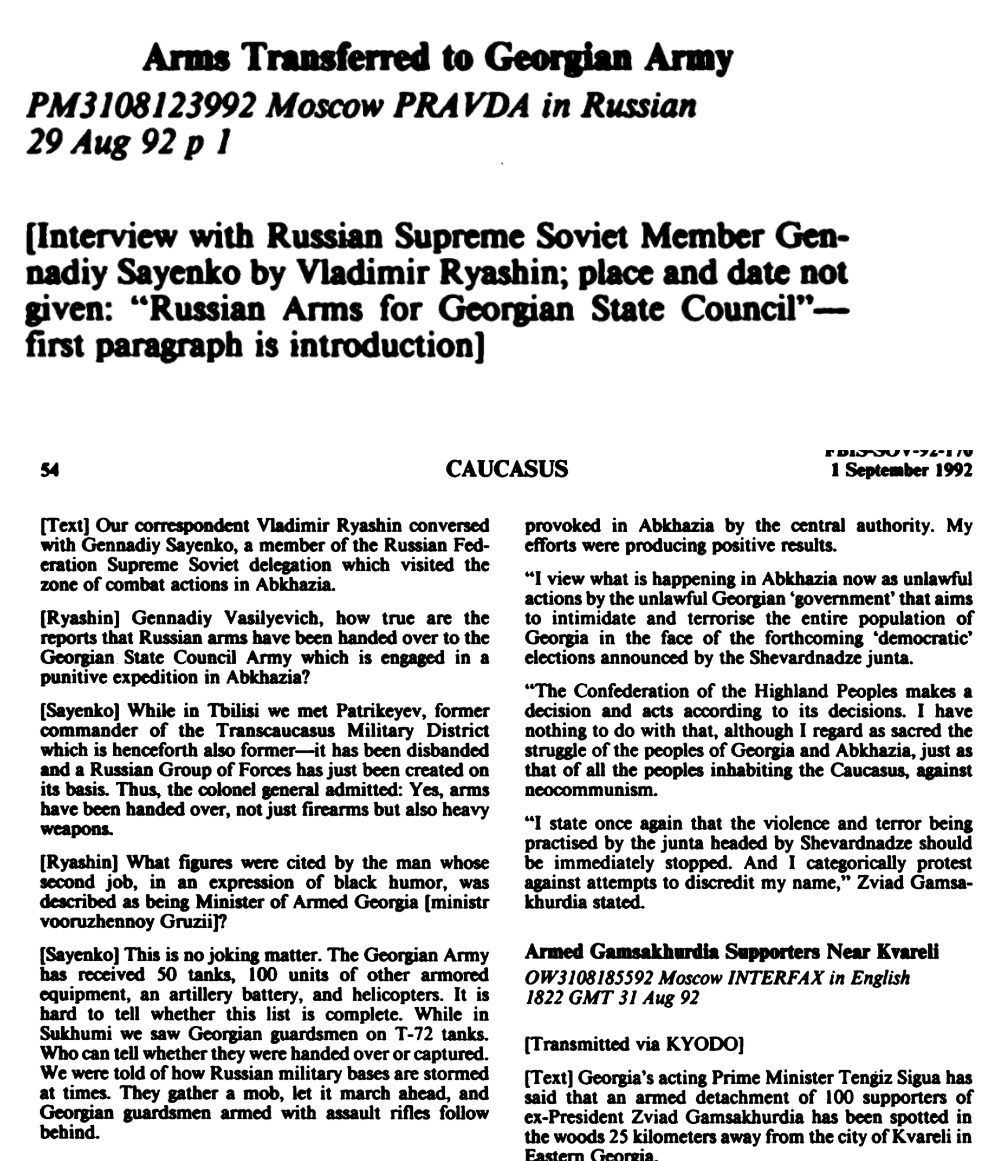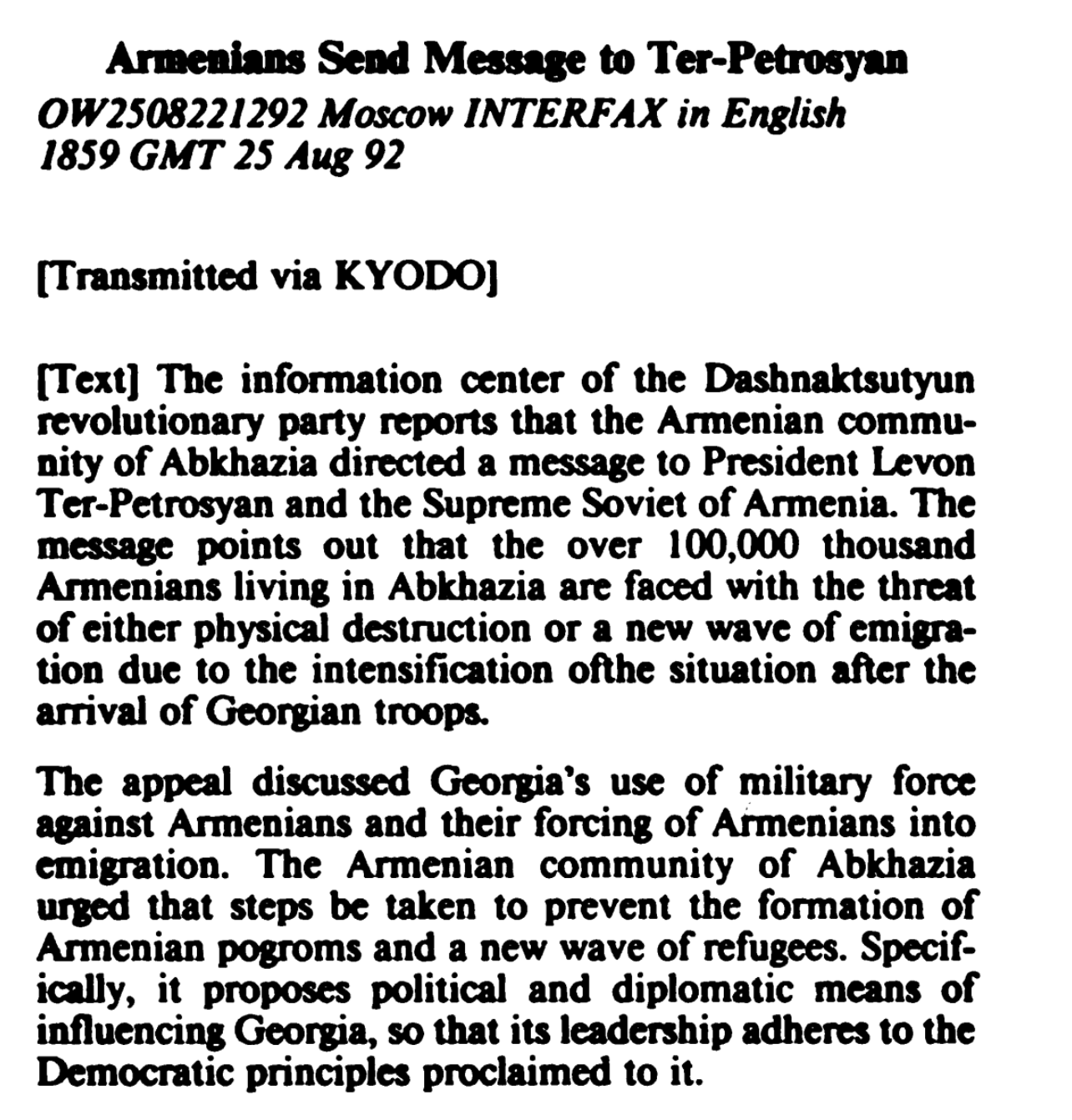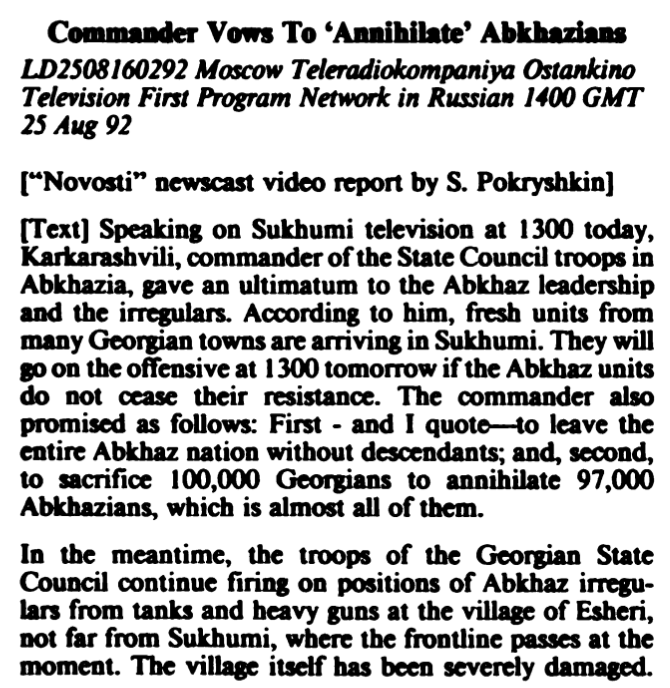'Absence of Will': A commentary
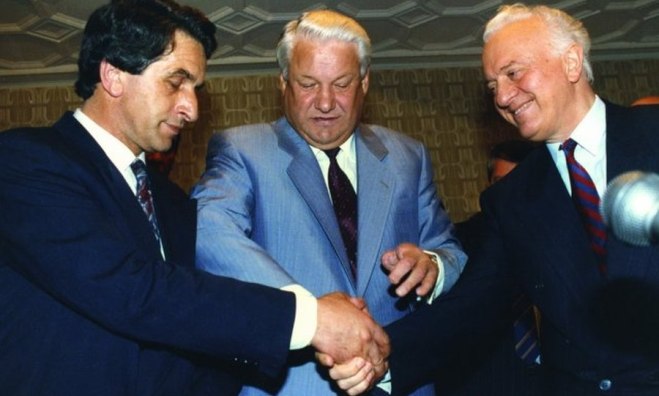
Vladislav Ardzinba (left) Boris Yeltsin and Eduard Shevardnadze after a meeting in Moscow
The documentary film "Absence of Will'', financed by Conciliation Resources (UK) and the Heinrich Boell Foundation (Germany), produced by Studio RE, and directed by Mamuka Kuparadze, was broadcast in 2009 for the first time. It is of great importance to anyone who wishes properly to understand the Georgian - Abkhaz War of 1992 - 1993.
When I first watched it, I was surprised to find myself watching those responsible for starting the war as they confessed, with regret, the facts that I already knew all too well. While listening to these confession-like statements, the many articles, books and published comments (positive and negative) about this issue flashed across my mind. Then, I decided that it would be a useful exercise to combine elements from these sources and set them alongside the script of the documentary by way of commentary to serve as a guide for those desirous of understanding the 1992 - 1993 war.
I am of the opinion that presenting the facts, which have been so extensively denied and/ or distorted, in such a comparison is of fundamental importance. I provide dates for the conversations shown in the documentary. The citations highlighted in colour are taken from other sources. And to demonstrate the effects of Georgian black propaganda on Georgian society itself, I show some "print screened" comments from various web-sites. My aim is quite specific: to show the effects of Georgian black propaganda with relevant examples.
Documentary - Absence of Will
Vimeo: http://vimeo.com/8826939 - YouTube: https://www.youtube.com/watch?v=WAYAK-ALjGw
[4:34 sec.] Reporter: Mr. Shevardnadze, could you we have prevented the war in Abkhazia?Eduard Shevardnadze: Of course we could. However, we need to remember the times we were living in back then and what was going on in Georgia at the time. But [Tengiz] Kitovani, the defence minister, should never have sent troops to Sukhumi. That was our biggest mistake.
Excerpt from UNPO’s Abkhazia Report: ‘...When Georgian troops under general command of Defense Minister General Tengiz Kitovani first entered Sukhumi on August 14, Georgian soldiers attacked non-Georgian civilians, beat them, killed many, robbed them, and looted their houses and apartments. Reports of attacks on Abkhazian, Armenian, Russian, and other non-Georgian minority civilians, including killing, torture, and burning, looting or smashing of houses or other belongings, originate from many regions of Abkhazia under Georgian military control and for the entire period since August 14.’ [UNPO: November 1992 Mission to Abkhazia, November 1992, b. Human Rights and Cultural Destruction]
Shevardnadze: The trains running from Sochi to Sukhumi were being attacked and robbed all the time. Russia, Ukraine and other countries wrote to protest and demand that we should do something about it. The police weren’t up to the task so we had to send in the army.
Reporter: But they didn’t need tanks and heavy equipment to protect the railway.
Shevardnadze: As far as I remember Kitovani didn’t have any tanks. He had cannons, machine-guns, guns and other things…
[18:10 sec.] Guram Odisharia [Mingrelian writer]: If I’d thought for one moment that something was about to happen I would have got my family out of there. But it was a complete shock to me when the war started. I was on holiday when it happened. I was swimming in the sea when I saw two helicopter-gunships dropping bombs on the town. I could see black smoke rising around my house. We counted 55 tanks.
Excerpt from unpublished letter to ‘The Guardian’ (7 October 1992) '...Shevardnadze’s first excuse for sending the troops into Abkhazia was to free his kidnapped ministers; it was only in his Independent interview (24 Sept) that his latest excuse became the defence of his railway-link to Russia. Your readers should know that it was Gamsakhurdia-supporting Mingrelians [NOT Abkhazians] who kidnapped the ministers and kept disrupting the railway-line. The troops went in solely to block the independence-moves.' [See: APPENDIX 2, ''Abkhazia: a problem of identity and ownership: History and Documents'', by George Hewitt, 1993.]
[11.52 sec.] Gia Karkarashvili [General - Army Commander of the State Council of Georgia]:In the first place, the Ossetian war [1991-92] in Tskhinvali had just ended. The Georgia National Guard suffered heavy losses. We were exhausted. That’s why I thought it was reckless to go into Abkhazia. But I was told that the 13th-14th August was a good time to launch a military operation because the Russian Parliament was in recess. Unfortunately, we entered Abkhazia in a very disorganized way. We didn’t even have a specific goal [REMEMBER the claims about protect the railway] and we started looting villages along the way.As a result, in the space of a month we managed to make enemies of the entire local population, especially the Armenians.
***
Guram Odisharia: At first the Georgians were better armed. The Russian government gave us a whole tank division. But then they started to arm the Abkhaz too.
NB: Boris Yeltsin, together with Georgia, put Abkhazia under sanctions and Yeltsin actually gave Shevardnadze the green light to attack Abkhazia on 14th August 1992.
Excerpt from George Hewitt’s ''A Reply to Svante Cornell’s Daily Telegraph Article'' (16 June 2009, Abkhaz World) ‘…And let it not be forgotten that for most of the 1990s, especially when Shevardnadze-protegé Andrej Kozyrev served as Boris Yeltsin’s Foreign Minister, Russia’s policy was by no means pro-Abkhazian, a CIS-blockade being imposed along Abkhazia’s River Psou border with Russia.’
See also: The Blockade of Abkhazia
Excerpt from Dodge Billingsley's [Director - CombatFilms.com] ''Military Aspects of the War: the Turning Point'':...There were, however, verified cases of Russian assistance. Russian pilots were actually shot down by Kartvelian units, but the incidents were isolated and more likely reflected free-lancing by rogue elements of the Russian military, a fact which has precedence elsewhere in the Caucasus, including the earlier Georgian conflict in South Ossetia. Moreover, there were other indications that Russia (Yeltsin) knew of Shevardnadze's plan and was prepared to look the other way. Commenting on the unruly nature of the Kartvelian forces, Shevardnadze remarked that he was against sending his troops into Sukhum: 'I wanted our military units to go around Sukhumi and move to Gagra... When I spoke to Yeltsin on the next day [after the beginning of hostilities], he told me: "The generals can get out of control and you, as a smart man, should know it".'['The Georgian Chronicle', Monthly Bulletin, January-February 1993, p.7.] Russia did meddle in the conflict, but the factor that made the difference were the hundreds and hundreds of volunteers that made their way to the region to engage Kartvelian forces throughout the war. This is not to say that the volunteers might not incidentally have served the strategy of some circles in the Russian military-political arena'.
Interview with Russian Supreme Soviet Member Gennadiy Sayenko. Sayenko confirms Guram Odisharia with saying: The Georgian Army has received 50 tanks, 100 units of other armored equipment, an artilery battery, and helicopters.
See: Russian Officer Views Abkhaz Conflict (27 April 1993) | FBIS Report
Also see report below:
Translated and published by The Foreign Broadcast Information Service (FBIS) [CIA] (August 29, 1992).
See also: Esmeralda Arshba on Georgian - Abkhaz Conflict | From the Finnish Documentary "Ei-toivottu valtio (An Unwanted State") (With English Subtitles) , by Kai Juvakka. (2010)
Another excerpt from George Hewitt’s ''Abkhazia, Georgia, and history: a response'' (openDemocracy, 25 August 2009): ‘…The concluding chapter of that war is often seen as one of the ethnic cleansing of the Kartvelian residents of Abkhazia. Two near-contemporary reports - from the United Nations in November 1993, and from the Unrepresented Nations and Peoples' Organisation (UNPO) in December 1993 - state that they could find no evidence of such an action. A little book called The Pass of the Persecuted (Tbilisi, 2001) by the Mingrelian writer Guram Odisharia - who himself fled via the Kodor valley into Svanetia - describes the horrors he experienced along the route.
Guram Odisharia makes clear that the flight of residents from the south of Sukhum took place before the arrival of Abkhazian troops, which took place after the fall of Sukhum on 27 September 1993; and that their attempt to travel along the direct highway into Mingrelia (the natural route) was stopped by Georgian forces, who ordered them back and threatened them ("Go back, or we'll kill all of you! Who gave you the order to leave the town!"). In addition, Odisharia reports that there were incidents of Svans robbing their near-destitute fellow-Kartvelian Mingrelians after they had survived the trials of passing over the mountain-pass. Such elements of the historical record do not fit the neat categories some are tempted to impose on it for contemporary political convenience.’
***
Shevardnadze: The Abkhaz got scared and they all left Sukhumi. Only a few of them stayed behind working for the government.
Reporter: But the Abkhaz were asking for a lot, weren’t they. They wanted self-government, real autonomy. After the war they were calling for a federation with Georgia. And what’s wrong with that? If they asked for a real autonomy today, wouldn’t you give it to them?
Shevardnadze: Of course I would.
Reporter: So why didn’t Georgia agree to their demands back then?
Shevardnadze: Because in those days most Georgians thought quite differently about the Abkhaz.
[08:22 sec.] Zviad Gamsakhurdia [First President of the post-communist Republic of Georgia]: ‘‘--We will stand by them as long as they right historical wrongs, leave Georgia and go back to where they came from(*). Don’t listen to anybody who tries to present the truth in a different way. The Abkhaz nation doesn't exist’’.
See: Zviad Gamsakhurdia: “Abkhaz Nation Doesn’t Exist!”
(*): Excerpt from George Hewitt’s ''Why Independence For Abkhazia Is The Best Solution'' (EurAsia Critic, June 2008): ‘One particularly loathsome feature was the publication of a blatant distortion of Abkhazian history, concocted to justify any transportation, by P’avle Ingoroq’va, who argued that today's Abkhazians arrived in Transcaucasia only in the 17th century, displacing and taking the name of history’s ‘true’ Abkhazians, who were a Georgian tribe! This slander was revived in late 1988 and is widely believed throughout Georgia, having been taken up by several writers and scholars in the evident belief that serving nationalism is nobler than serving the truth. This explains why so many Georgians refer to Abkhazians as ‘Apswaa’. This is what Abkhazians call themselves, and, at first glance, it might seem that those Georgians who adopt it are actually showing respect for their neighbours' self-designation. In fact, its use is an insult, implying that 'Abkhazians' equate to Georgians, whereas ‘Apswaa’ are their usurpers and, thus, foreign interlopers on 'Georgian' soil. Though anti-Abkhazian measures were put into reverse after the deaths of Stalin and (Abkhazian-born Mingrelian) Lavrent'i Beria in 1953, problems remained.
An excerpt from the facebook group: ''For Georgians and Apsuas who think of each other as brothers and want peace''
http://www.facebook.com/group.php?v=wall&viewas=0&gid=19687249188 (Accessed 25 January, 2010)

NB: According to the 1989 census there were only 239,872 "Georgians" living in Abkhazia. [See Table 13. ''Ethno-demographic history of Abkhazia, 1886 - 1989, by Daniel Müller.''] Some of them NEVER left Abkhazia after 1992 - 93 war.
An Excerpt from "The Georgian Chronicle", '...According to the Georgian State Committee for Refugees and Displaced Persons, some 160,000 refugees from Abkhazia have been officially registered and accommodated in 63 districts of Georgia', cf. February-March 1994, as cited in A. Zverev, Ethnic Conflicts in the Caucasus. In: Bruno Coppieters (ed.). Contested Borders in the Caucasus, Brussels: VUB University Press, 1996, pp. 13-71.
See also the dialogue between ''Aleksandre Chikvaidze'' and ''Lord David Annals'': https://abkhazworld.com/aw/conflict/678-georgian-apologists-hewitt
An excerpt from Mikheil Saakashvili's speech:'...About 450,000-500,000 pride residents of Abkhazia live in exile in their own country. They cannot return to their homes, to their villages, to their family members and relatives, to the graves of their ancestors, to their friends, with whom...' http://www.president.gov.ge/index.php?lang_id=ENG&sec_id=228&info_id=4210
NB: Georgian population fled before Abkhaz Army entered the occupied territories: See: 'THE MAJORITY OF GEORGIANS, HOWEVER, FLED BEFORE ABKHAZIAN AND NORTHERN CAUCASUS TROOPS ARRIVED.' [Report of a UNPO Coordinated Human Rights Mission to Abkhazia and Georgia, p.13]
Abkhazia unilaterally decided to open the gates for the (largely Mingrelian) refugees to return to Abkhazia from Georgia in 1999. Georgia at that time was actually accusing these refugees of being TRAITORS to Georgia. The largest concentration of Georgians within Abkhazia was in the Gal region. Since the war, more than 52,000 refugees have returned to Gal. In addition, at least 15,000 Georgians have returned to other regions of Abkhazia.
An another excerpt from a comment (by Anonymous reader - May 5, 2008) for the ''Abkhazia: Frozen Conflict?'' article.
(Accessed 25 January 2010)

***
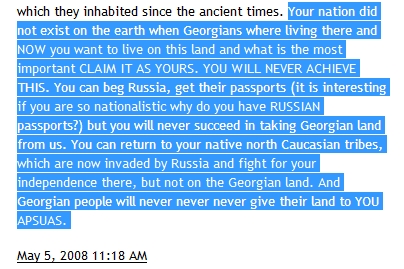
Another comment by Anonymous reader from the same web site.
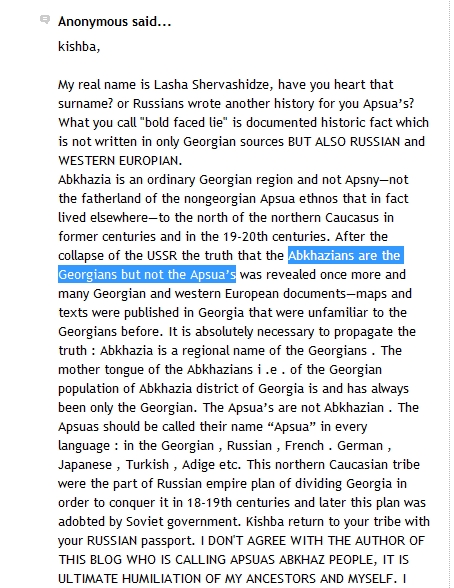
Excerpt from Ucha Nanuashvili’s ''Why I Apologize To Abkhaz People: Choice for Georgia: Georgian Chauvinism or Abkhazia?'' (HumanRights.ge December 29, 2009) - '...Maybe we are really guilty in something. How true is our history, theories of historian Marika Lortkipanidze(*) and other scientists about settlement of Abkhaz people in the 16th century and whether “real Abkhaz people” are Georgians and Apsua are different nation who have done so much wrong. Let us say that all this is true, what then? Shall we resettle Abkhaz people back to north Caucasus?'...
(*)Actually, Lortkipanidze is associated with the theory that Abkhazia had aboriginal peoples: Kartvelians and Abkhazians.
Ucha Nanuashvili: '...It is curious how sensitive is Georgian society about Abkhaz nation and how they respect them? Are we sincere in our statement – we want to live together with Abkhaz people when we cannot understand each other at all. If Abkhaz people are guests for us who “live on our holly land and should be grateful to us because they are alive and breath fresh air”, and translation of the Bible in Abkhaz language is unacceptable for many people and if we think that Abkhaz people are Georgians in fact and Abkhaz nation does not exist at all. Maybe we should find out who burnt state archive and scientific-research institute in Sokhumi during the war.(**) Let us confess what we have done to save Abkhaz language and culture.'
http://www.humanrights.ge/index.php?a=article&id=4517&lang=en
(**) A history erased - Abkhazia's archive: fire of war, ashes of history
NB: It was done to try to erase documentary proof of the Abkhazians' presence over the centuries (not to say millennia) on Abkhazian soil.
An excerpt from Sam Topalidis' ''A Pontic Greek History'', 2007 - Australia - p.140 - ''Note 2.3 Ascherson (1,1995, pp. 253-4), describes how the State Archives building was destroyed during the civil war in Abkhazia. -- '...One day in the winter of 1992, a white Lada without number-plates, containing four men from the Georgian National Guard, drew up outside. The guardsmen shot the door open and then flung incendiary grenades into the hall and stairwel. ... Sukhum citizens tried vainly to break through the cordon and enter the building to rescue burning books and papers. ... The archives also contained the entire documentation of the Grek community, including a library, a collection of historical research from all the Grek villages of Abkhazia and complete files of the Grek language newspapers going back to the first years after the revolution.'
See also: ''Abkhazia's archive: fire of war, ashes of history'', by Thomas De Wall, openDemocracy. October 20, 2006
Excerpt from Ghia Nodia's article ''The Conflict in Abkhazia: National Projects and Political Circumstances.''[Ghia Nodia is a Georgian political analyst who served as the Minister of Education and Science in the Cabinet of Georgia. 2008]‘...Of course, Georgian nationalists, especially in Gamsakhurdia's era, were not exactly sensitive to minority issues either. According to many accounts, "Georgia for the Georgians" was Gamsakhurdia's slogan, though this in fact is not true - I personally never saw this kind of slogan at his rallies, nor have I seen anybody quoting any source on this - but it probably did express his true attitude. It is easy to find plenty of downright racist quotations from the Georgian press of that period. The difference here, however, is that at least Georgian nationalists could refer to the democratic legitimacy of majority rule in this case, which the Abkhaz could not.‘
''Absence of Will'' documentary film shows this slogan in 10:57 sec. [on YouTube: http://www.youtube.com/watch?v=bBk-lwFXqV8 (1.28 sec.)]
And note this passage from the forthcoming book on the conflict by George Hewitt: ‘Article 12 of the National Democratic Party's Programme includes the following: “Three autonomous units were created in Georgia, and this when the territories of the Abkhazian Autonomous Republic and the South Ossetia Autonomous District are historical territories that belonged to Georgia from the beginning, whilst the ‘Autonomous Republic of Ach’ara’ was in fact created purely on account of religious principles, which represents something fully unexpected in the conditions of an atheist state”. The manifesto-statement goes on to note: “Our slogan is ‘Georgia for the Georgians’, which in no way implies suppression of the rights of the ethnic groups living on Georgian territory or limitation of their political freedom”. This slogan is usually ascribed to Gamsakhurdia, but clearly it was originally devised by Ch’ant’uria, though it came to be the rallying cry of Georgian nationalism in general.’
***
[11.52 sec.] Gia Karkarashvili [General - Army Commander of the State Council of Georgia]: In the first place, the Ossetian war [1991-92] in Tskhinvali had just ended. The Georgia National Guard suffered heavy losses. We were exhausted. That’s why I thought it was reckless to go into Abkhazia. But I was told that the 13th-14th August was a good time to launch a military operation because the Russian Parliament was in recess. Unfortunately, we entered Abkhazia in a very disorganized way. We didn’t even have a specific goal [REMEMBER the claims about protect the railway] and we started looting villages along the way. As a result, in the space of a month we managed to make enemies of the entire local population, especially the Armenians(*).
Reporter: Did they turn against us just because of the way our troops behaved?
Karkarashvili: No, not just because of that. But we shouldn’t have allowed all that hatred to build up. We could have prevented it, but we didn’t.
(*)See Video: Volunteers fight for Abkhazia against Georgia | 1992-93 War: http://www.youtube.com/watch?v=ylaJAGFu-CE [1:17 sec.- Armenian batallion - Bagramyan]
Also: Armenian Community in Abkhazia: http://www.youtube.com/watch?v=HKwPt5xD4K0
See: Georgian-Abkhaz Conflict | FBIS Reports (Aug-Oct. 1992)
Two comments for this video. TeamSTALKERS, an Armenian and RezoChigogidze, a Georgian. [Accessed 25 January 2010]
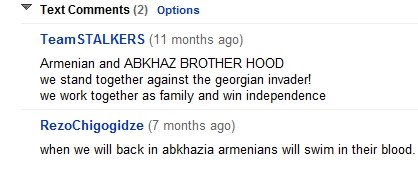
Another comments for the video ''For Armenians...'' added by KingdomOfGeorgia.
See: http://www.youtube.com/watch?v=wqUn1qnDWKM [Accessed 15 January 2010]
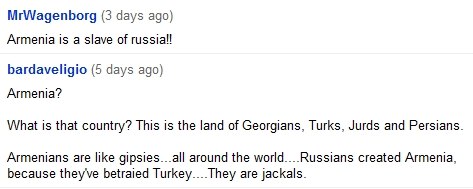
An excerpt from UNPO’s Abkhazia Report. [UNPO: November 1992 Mission to Abkhazia, November 1992, b. Human Rights and Cultural Destruction] ‘…The Mission obtained sufficient evidence to conclude that gross and systematic violations of human rights had occurred at the hands of Georgian troops in Abkhazia throughout the period since August 14, 1992; that these included serious violations committed against Abkhazian and other ethnic population groups in cities and villages; that civilians were the primary victims of Georgian abuses; that Georgian attacks were directed against persons identifiable as Abkhazian, and that particular attack was directed against Abkhazian political, cultural, intellectual and community leaders; that in addition to Abkhazians, also Armenians, Russians, Greeks, Ukrainians, Estonians, and other non-Georgian minorities in Abkhazia have suffered similar treatment by Georgian authorities; and that removal or destruction of the principal materials and buildings of important historical and cultural importance to Abkhazians has taken place in what appears to be an organized attempt to destroy Abkhazian culture and national identity.’
‘...Additionally, the Commander-in-chief of Georgian troops in Abkhazia, General Georgiy Karkarashvili warned in a televised formal address to the Abkhaz and Georgian people in Sukhumi on August 24, that “no prisoners of war will be taken” by the Georgian troops, that “if 100,000 Georgian lose their lives, then [on the Abkhazian side] all 97,000 will be killed”; and that “the Abkhaz Nation will be left without descendants.” The delegation saw a video recording of this ominous speech.’
http://www.unpo.org/downloads/AbkGeo1992Report.pdf
An excerpt from George Hewitt's ''Post-war Developments in the Georgian-Abkhazian Dispute'' [Parliamentary Human Rights Group, 1996, Section 3: Propoganda] '...As a final example of black Georgian propaganda we can cite the case of Svetlana Chervonnaya, a specialist from Moscow on Tatar affairs, who, for reasons best known to herself, chose to write a pro-Georgian, anti-Abkhazian book entitled, in the English version, 'Conflict in the Caucasus'. Let's pick out just one comment: on page 196 the author denies that the threat by the then-commander of the Kartvelian forces in Abkhazia, Gia Qarqarashvili, to wipe out all 97,000 Abkhazians was ever made, saying: "The outright exaggeration of Qarqarashvili's statement [...] is easily revealed if this text [from Nart, 2nd Sept 1992] is compared with what he actually said on TV.' Not only does anyone who has seen the TV-statement know that the threat was indeed made, but the Georgian newspaper '7 Days' printed it in Georgian translation of the Russian original in issue 31 (4-10th Sept 1992), and so the nature of Chervonnaya's deceit is plain for all to see, but how many of those receiving the no doubt free copy of this English version on their 'fact-finding' missions to Tbilisi will have this pointed out to them or take the trouble to check for themselves all the other 'facts' assembled here? As an excellent indication of the standard of scholarship in Georgia, it should be noted that Madame Chervonnaya was awarded an Honorary Doctorate by Tbilisi University in April 1996...
See the video: Gia Karkarashvili, the Georgian Commander-in-Chief on TV threatens the Abkhazian nation with genocide:
http://www.youtube.com/watch?v=XzvtaZIMy98
See: Georgian-Abkhaz Conflict | FBIS Reports (Aug-Oct. 1992)
NB: A similar threat came from the head of Georgia's wartime administration, Giorgi Khaindrava, on the pages of Le Monde Diplomatique in April 1993. Goga (Giorgi) Khaindrava, told the correspondent from Le Monde Diplomatique that "there are only 80,000 Abkhazians, which means that we can easily and completely destroy the genetic stock of their nation by killing 15,000 of their youth. And we are perfectly capable of doing this."

[13:48 sec.] Karkarashvili: I feel really sorry for young Abkhaz and Ossetians. But as soon as I hear the call to arms, something inside me kicks in and I support it. It’s our split personality. Humanity, on one side, and our motherland, on the other.
***
Reporter: So what went wrong between the Georgians and the Abkhaz?
[15:40 sec.] Guram Odisharia: I remember when I was still a boy, the Abkhaz would gather on Lenin Square in the centre of Sukhumi to discuss the demographic situation. They wanted to have their own Abkhaz language, television channel and their own university. The kind of things any nation, large or small, should have.
Reporter: What were ordinary people saying and how was it all being reported in the media?
Guram Odishaira: We Georgians told the Abkhaz that they were a minority and they shouldn’t forget that they only made up 17% of the population.(*) One famous Georgian poet wrote that you could actually fit all the Abkhaz into two football stadiums. It was outrageous!
(*)When most of Abkhazia was denuded of its native population in the wake of (a) the end of the Great Caucasian War in 1864 and (b) the Russo-Turkish War of 1877-78, the question arose as to who would make the most appropriate substitute-population. One of the leading Georgian intellectuals of the time, the educationalist Iakob Gogebashvili, wrote an interesting article in Tiflisskij Vestnik in 1877 entitled /vin unda iknes dasaxlebuli apxazetshi?/ (Who should be settled in Abkhazia?). In this article he argued that the neighbouring Mingrelians would make the best /kolonizatorebi/ (colonisers)... And this is precisely what they subsequently became.
An excerpt from Teymuraz A. Achugba's ''The ethno-demographic aspect of the Georgian-Abkhaz conflict''. '...It was no accident that the Georgian newspaper ‘Shroma’ considered Georgian acquisition of the land in Abkhazia and Circassia as ‘one of the most wonderful events’ in the life of the Georgian nation ['Shroma', 1882, №15 (in Georgian)]. On 4 February 1879 another newspaper, the ‘Droeba’, urged its readers: ‘Let us expand while there is still time to do it, before other peoples come and settle the empty spaces of our Caucasus.’ While the aforementioned issue of ‘Shroma’ pleaded with its readers: ‘Send us lots of Rachintsy, Lechkhumtsians, Upper Imeretians and Mingrelians from our mountainous regions!’ ['Shroma', 1882, №15 (in Georgian)].'
Graphic: Demographic change in Abkhazia 1897–1989 (Conciliation Resources - 'The roots of the conflict', by Bruno Coppieters (September 1999)
See also: ''Ethno-demographic history of Abkhazia, 1886 - 1989'', by Daniel Müller.
An excerpt from Tim Potier's ''Conflict in Nagorno-Karabakh, Abkhazia and South Ossetia: A legal Appraisal. Kluwer Law International. The Hague''. (2001. p.9) '...Abkhazia suffered considerably under Stalin during the 1930s. In February 1931 the status of Abkhazia was reduced to that of an autonomous republic within Georgia. In 1937, the head of the Georgian Communist Party, Lavrenti Beria undertook his 'anti-Abkhazian drive', involving the forced immigration of thousands of non-Abkhazians (especially Mingrelians) into Abkhazia. After Beria's transfer to Moscow in 1938, anti-Abkhazian measures continued under his successor, Kandid Charkviani. The Abkhaz alphabet was changed to a Georgian base. During 1944-45 all Abkhazian schools were closed, replacing them with Georgian schools, and the Abkhaz language was banned from administration and publication.''
Excerpt from Alexander Krylov's ''The Georgian-Abkhazian Conflict. The Security of the Caspian Sea region.'' SIPRI. Oxford University Press. 2001. p. 283) '...In the mid 1950s, in line with the ideological goals of the resettlement policy, a theory was fabricated declaring the true Abkhaz to be an ancient cultural Georgians living on the territory of Abkhazia and describing the modern Abkhazians as those who moved into Abkhazia from the north in the 17th century. The thesis of the resettlement of Abkhazians became part of a racist theory asserting a supposed primordial superiority of the ‘civilized’ Georgians over their neighbours- a theory which dominated in Georgian science and public consciousness.'
Excerpt from JRL Research and Analytical Suplement's ''The Georgian-Abkhaz Conflict: Past, Present, Future'' (Issue No.24, May 2004) '...During the early years of Soviet rule, Abkhazia and Georgia were separate and equal union republics. In 1931 Abkhazia was forced to join Georgia, but it retained some autonomy until 1936, when Abkhaz leader Lakoba was poisoned by Georgian party boss Beria.
From 1937 until Stalin's death in 1953 Abkhazia was subjected to forced Georgianization. More Georgians were settled in Abkhazia and Abkhaz children were punished for speaking their native language.’ http://www.cdi.org/russia/johnson/8226.cfm
The film-clip (from a 30-minute documentary on Abkhazia shot in 1941) talks of settlements having been created in the Gagra, Gudauta and Ochamchira districts and shows incomers travelling on carts, the building of their homes, and one family actually moving in. The scale of the population-movement can be seen by comparing the census-data for 1939 vs 1959, which demonstrates that the number of Kartvelians (viz. Mingrelians, Georgians, Svans, Laz, but chiefly Mingrelians) resident in tiny Abkhazia shot up by some 66,000, with extremely damaging demographic consequence for the native Abkhazian percentage of the overall population.
***
See also: ''Declaration of the Revolutionary Committee of the SSR of Georgia on Independence of the SSR of Abkhazia'' - 21 May 1921
Reporter: What did the Abkhaz want?
[21:12 sec.] Georgi Anchabadze [Historian]: Perhaps they wanted complete independence from Georgia. They certainly didn’t want to join Russia again. Even now they don’t want that(*). They wanted more real political rights within Georgia.
Even after the war...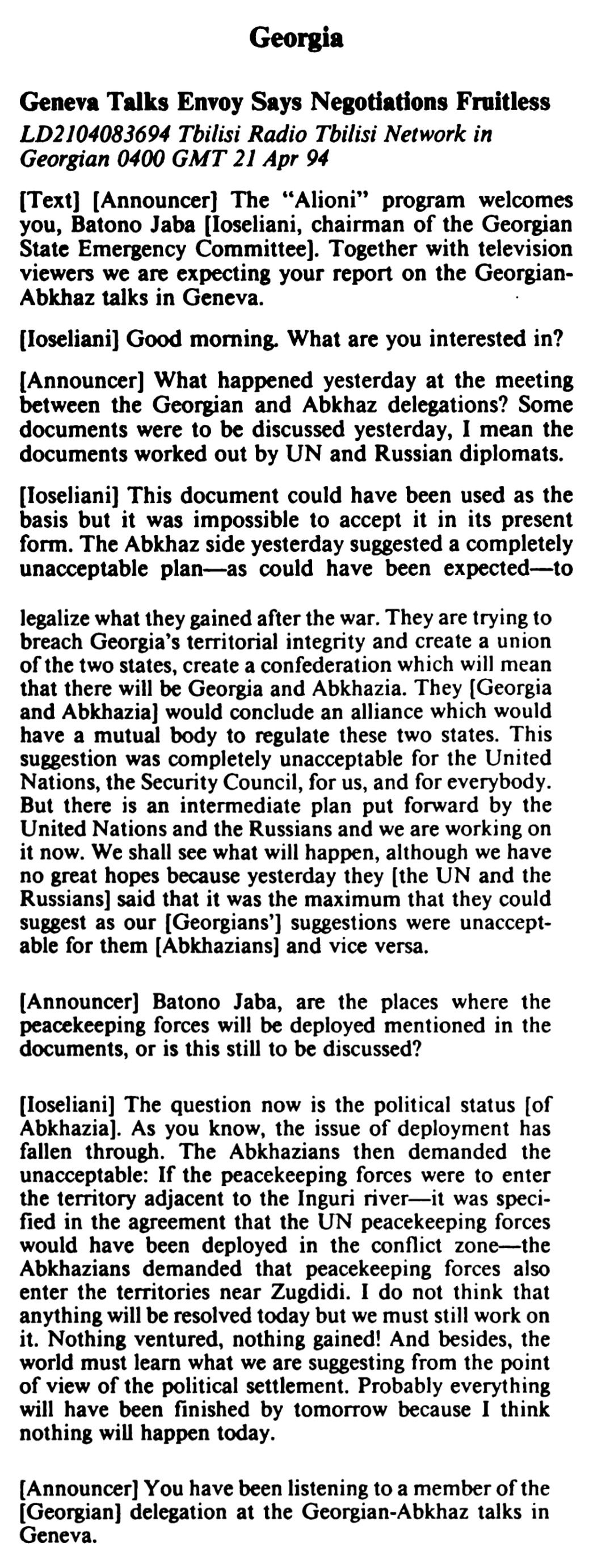
(*)''Abkhazia has no plans to accede to Russia or any other state – Bagapsh'' (March 17, 2009 – Itar Tass)
'Excerpt from Stanislav Lakoba's ''Abkhazia is Abkhazia''. (23th April, 1993, London) '...As for our own position, we could note the following - today some people say that Abkhazia is Russia, others that it is Georgia, while the fact is that Abkhazia is Abkhazia. And at the end of the A 20th century we want to preserve our own identity, our own face for the simple reason that it is ours, even if somebody else may not find it appealing.'
[Absence of Will] Anchabadze: They offered three choces:
1. Georgia should become a federation with Abkhazia.
2. Abkhazia should become a republic within Georgia.
3. A two-chamber parliament should be set up.
Georgia said no to all of these things.
NB: The Abkhazians wanted a 2-chamber parliament, but Gamsakhurdia refused to allow this, suggesting the single-chamber parliament with ethnic quotas that led to predictable deadlock in 1992.
An excerpt from George Hewitt’s ''A Reply to Svante Cornell’s Daily Telegraph Article'' (16 June 2009)'...Contrary to various misinformed reports, Abkhazia did not declare independence from Georgia either before, during, or upon its victory in, the war. Throughout years of negotiations, Abkhazia was willing to contemplate making a concession and to enter confederal relations with Georgia. And let it not be forgotten that for most of the 1990s, especially when Shevardnadze-protegé Andrej Kozyrev served as Boris Yeltsin’s Foreign Minister, Russia’s policy was by no means pro-Abkhazian, a CIS-blockade being imposed along Abkhazia’s River Psou border with Russia. But let us see what I had to say on this matter in my earlier review: ‘Abkhazia did not formally declare independence until 12 October 1999. And this was in large measure the result of frustration at continuing bad faith on the part of Tbilisi in post-war negotiations. Pace Cornell (p.192), it has not been the Abkhazians who have refused to compromise — one might say that after their military victory, they were fully entitled to declare independence at once (September 1993), and yet they continued to pursue federative possibilities, whilst all that Georgia has offered is a return to the status quo ante bellum (some compromise from Georgia!). After protracted talks and constant last-minute revisions by Georgia a Protocol was ready for presidential signing in summer 1997, and yet at the last minute Tbilisi (not Sukhum) refused (Abkhazian Foreign Ministry Document 325, 25 Dec 1997). Such petty obstructionism continues, for in February 2001 Georgia's UN Ambassador, P’et’re Chkheidze, refused to sign two draft-documents, claiming them “unacceptable for the government of Georgia” — as the respected commentator, Liz Fuller, noted in her Radio Liberty report (4.5, 2 Feb 2001): “Chkheidze's criticism is surprising as the versions of both drafts currently under discussion were proposed by the Georgian side”.
Excerpt from Stanislav Lakoba's ''Abkhazia is Abkhazia''. (23th April, 1993, London) '...Well, almost - for such news-agencies as Reuters, AP, the BBC, whenever they refer to us, our standard epithets are ‘separatists’ and ‘rebels’... How is it that we are separatists when we are actually not separating from anybody or attacking anybody? Are there any resolutions of the Abkhazian Parliament adopted before August 14 1992 (or even several months afterwards) which have declared secession from Georgia? There is not one! In fact, it was the Abkhazian side that suggested building our relations with Georgia on an agreed, federative basis. Therefore, it was the Abkhazian side which came out with proposals that would preserve the unity of Georgia. The response was the despatch to Abkhazia of tanks, fighter-bombers and guardsmen armed to the teeth...’ We are being forced into a separatist-position by the actual separatists reigning in Tbilisi who are busy destroying their own country. They have cast their country, the unity of which was supported by the bayonets of the Stalinist Soviet Empire, back to the feudal division of the Middle Ages.’
***
[35:12 sec.] Paata Zakareishvili [Member of the Republican Party of Georgia, political scientist]: There was a good moment when Georgia offered some peaceful suggestions to Ossetia and the world. In December 2005 Kokoity [President of S. Ossetia] accepted this offer and sent back a public response where he highlighted the points he agreed to cooperate on.
[35:56 sec.] Kokoity speaking: We invite Georgia to sit down and settle all our differences at the negotiating table.
Paata Zakareishvili: The negotiations went on all through December and the two sides made progess. I said it was a good month because at the same time an agreement was also reached for a meeting between Saakashvili and Bagapsh, the Abkhaz president. The Abkhaz were talking to the Georgian president’s special envoy Irakli Alasania. The Georgian side accepted the offer and even prepared a draft for the Abkhaz side to consider.
Alasania managed to gain the trust of Abkhazia and he invited [Sergey] Shamba [Abkhazian Foreign Minister] to Tbilisi. Shamba brought an important new document with him called ‘‘A Key To the Future’’. We didn’t agree with everything in it, but there were many things we welcomed, like contacts with Europe. And for the first time in the history of the conflict, there was no mention of Russia at all. Shamba took the unique step of leaving the UN Office and walking down Shardeni Street in central Tbilisi. [37:09 sec.]
[37:23 sec.] Reporters: Do you like our culture?
Sergey Shamba: I’ve known about Georgian culture since I was a student here a long time ago. I have always liked it. I think such an ancient, spiritual culture is the reason this nation has managed to keep hold of its identity.
Paata Zakareishvili: Saakashvili should have at least come out and said that he welcomed such visits. But instead on that very same day he chose to go with the defence minister to visit the Senaki military base. A military base which was rebuilt to send a message to Abkhazia. It was a direct message from Saakashvili.
[38:04 sec.] Saakashvili visit to Senaki military base
Further reading:''Abkhazia-REAL Politics or Populist Rhetoric'' by Eka Kevanishvili, Tbilisi, (HumanRights.ge April 10, 2008)
When the Minister of Foreign Affairs of de-facto Abkhazia first appeared in Tbilisi in front of the media back in 2006, he was positive. Sergey Shamba even took a stroll down the upbeat Shardeni Street. At the time Georgian President Mikheil Saakashvili was making statements from Senaki military base along with the Minister of Defence. Experts who are the closest to the problem and who have been working on how to resolve the Abkhazian-Georgian conflict recount the rhetoric, and they consider it to be a typical example of populism … and not the kind of carefully considered statements that moves the politics towards Abkhazia in a proper direction…
NB: The 1994 Moscow Accords(*) which formally marked the ceasefire in the Georgian-Abkhazian war delimited a demilitarised zone. Despite this, Saakashvili decided in the spring of 2006 to introduce an armed force that he disingenuously described as a 'police-force' into the Upper Kodor Valley, the one part of Abkhazia over which the Abkhazians had not reestablished control when they achieved their military victory at the end of September 1993, on the pretext of establishing order in an area previously controlled by a local Svan strong-man named Kvitsiani; this Valley was part of the demilitarised zone. No sanctions were taken against Tbilisi by the international community as a result of this blatant infringement of the 1994 ceasefire-agreement. Between May 2006 and the expulsion of these troops on 12 August 2008, when the Abkhazians finally brought the whole of the Kodor Valley back under their control, much money was invested in the district by Tbilisi in order to demonstrate what benefits might flow from Georgian benevolence. The region was restyled 'Upper Abkhazia', the so-called Government of Abkhazia in Exile was transferred to a new headquarters in the village of Chkhalta, where the Abkhazians found a 'NATO Information Centre' along with a sign boasting 'Our Goal Is Near' when they entered the valley after the Georgian forces had fled in disarray, and a branch of Zugdidi Bank (with cash-dispensing machine) was set up in neighbouring Azhara. A landing-strip was constructed, and a HUGE amount of weaponry(**) (largely American, Israeli, Ukrainian) was taken up and stored there — for what purpose has never been explained. All of this ordinance was captured by the Abkhazians and removed to Sukhum, where it was briefly put on display together with trophies from the military base at Senaki in neighbouring Mingrelia, similarly abandoned by Georgian forces in their own headlong retreat when they realised the Abkhazians had crossed the border over the R. Ingur and were heading for that base. Also captured was a computer on which were found telling photographs depicting US military instructors giving lessons to Georgian troops in how to construct improvised bombs.(***) There are now plans to create a nature-reserve in the Upper Kodor Valley, construct a decent road to connect with the North Caucasus via the Klukhor Pass, and encourage tourism. Whilst those Svans who lived in the Valley are welcome to stay and/or resume residence (as long as they did not take up arms against the Abkhazians at any time since hostilities began back in 1989), but the days of Georgian dominance, as in Abkhazia as a whole, are gone forever.
Further reading: ''Georgia: Extent Of 'Victory' In Kodori Offensive Unclear'', by Liz Fuller, RFE/RL (August 01, 2006)
Georgian officials have sought topresent last week's incursion into the Kodori Gorge as a major territorial gain. But such claims gloss over the Georgian failure to apprehend former Kodori Governor Emzar Kvitsiani, whose defiance of the Georgian authorities served as the catalyst for what Tbilisi claims was simply a police operation. Speaking on national television on July 28, Georgian President Mikheil Saakashvili said that Georgia now "directly controls a very important strategic part of the territory of Abkhazia," and will "establish Georgian jurisdiction and constitutional order in the heart" of that breakaway region.
(*)Agreement On A Ceasefire And Separation Of Forces, Signed In Moscow On 14 May 1994 - In the Declaration on Measures for a Political Settlement of the Georgian–Abkhaz Conflict, signed in Moscow on 4 April 1994 (S/1994/397, annex I), the Parties committed themselves to strict compliance with a formal ceasefire from that date, and once again reaffirmed their commitment to the non-use of force or threat of the use of force against each other, as expressed in their communiqué of 13 January 1994. That commitment remains valid. This Agreement on a Ceasefire and Separation of Forces formalizes that commitment.
(**) Documentary: ''Georgia - Crisis in the Caucasus'', Journeyman Pictures (September 2008)
Transcript:
[Journeyman Pictures Reporter]--Abkhazians have been living under the threat of a full-scale Georgian invasion for years. And their President believes the recent attacks ordered by Georgia's President Mikhail Saakashvili had the backing of a greater power.
SERGEY BAGAPSH (Translation): The truth is Saakashvili would never have attacked either Abkhazia or South Ossetia without the go-ahead from Washington. That’s 100 per cent. They went in with US consent that is for sure, I know it and we have lots of evidence to prove it. We have photos of the Upper Kodori Gorge where Americans taught Georgian troops demolition techniques. I have photos they took and abandoned there.
[Reporter]--From ancient times, the Kodori Gorge has been a treasured and strategically important part of Abkhazia but since 1993 it has been under Georgian control, giving them a vantage point from which they could stage an attack and, according to Abkhazia's deputy Defence Minister, that's exactly what the Georgians were planning to do.
MAJOR GENERAL GARRY KUPALBA (Translation): This was a foothold that was to be used in future military operations. From this territory Georgian troops were to infiltrate the rest of Abkhazia. They intended to seize Sukhumi airport.... here....and to block....the Kodori River here, at the Kodori bridge thus splitting into two.
[Reporter]-- Major General Garry Kupalba says Abkhazia had proof and prior warning of the Georgian plans and so within days of Georgia's assault on South Ossetia the Abkhazian military seized the chance to reclaim the Kodori Gorge. With the approval of the Abkhaz army, I am the first journalist given permission to visit the Kodori Gorge since it was recaptured. Travelling by army helicopter, I’ve been provided with an armed escort and a military spokesman to guide me around. The Abkhaz are keen to show me what the Georgians were up to in the Kodori Gorge.
DIMA, ARMY PRESS OFFICER (Translation): For many years Georgia has been massively supplied with arms from the Western countries, countries such as the USA, Israel and so on. You can see extra proof of that here.
[Reporter] --We are in the village of Ajara and my guide – the Abkhaz army's press officer, Dima – wanted to show me evidence of the Georgian military build-up here – a weapons stockpile which he claims was ignored by observers from the United Nations.
DIMA (Translation): As you see we are now at the UN base, it’s an observation post of the United Nations observer Mission. So really, in violation of all agreements, the Georgian side brought these heavy-calibre howitzers here.
REPORTER: And the United Nations was just over here, just a few metres away?
DIMA (Translation): Yes, they were here and they were supposed to watch that this area was demilitarised. But as you can see....all these weapons are Georgian trophy weapons.
[Reporter]--With freedom to explore the area, I soon discover that there's plenty of evidence to support Abkhazia’s suspicions about a planned invasion by Georgia - a plan that may have had the tacit approval of NATO.
Now, the Abkhazian army wanted to point out to us these rations that they've found here – they're marked "NATO-approved rations". There's the Halo Trust here and Russian peacekeepers behind me. They've been going around, picking up the weapons and blowing up the explosives and anything dangerous that they find, but what they're really concerned about is the evidence, they say, that NATO personnel have been here. Perhaps there were American soldiers based here in the gorge before it was captured by the Abkhazian army.
SOLDIER (Translation): This is an army ration, everything is in English for some reason. It’s not in Georgian or whatever, it’s in English.
Full transcript: http://www.journeyman.tv/?lid=59119&tmpl=transcript
(***) US military instructors giving lessons to Georgian troops in how to construct improvised bombs. (Source: The Federal Government of the Russian Federation and the Abkhazian Government, Russian News and Information Agency.)
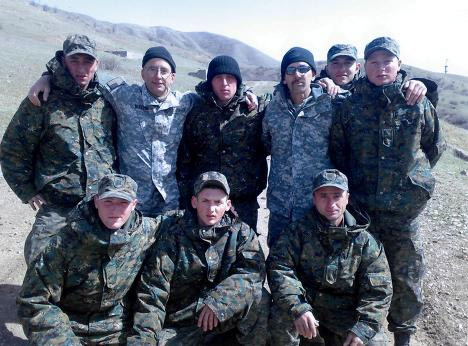
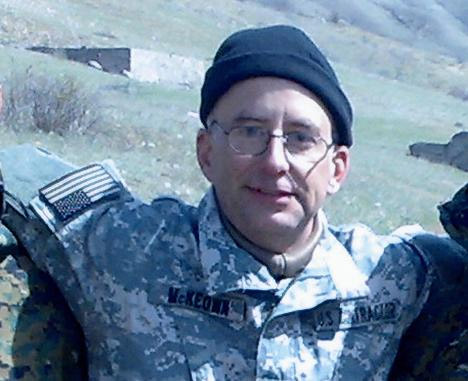
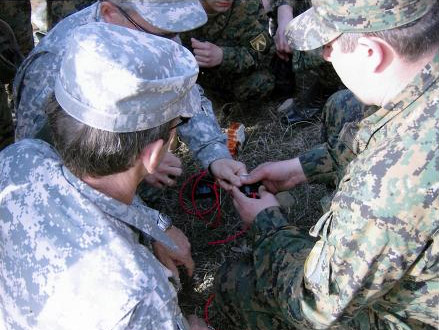
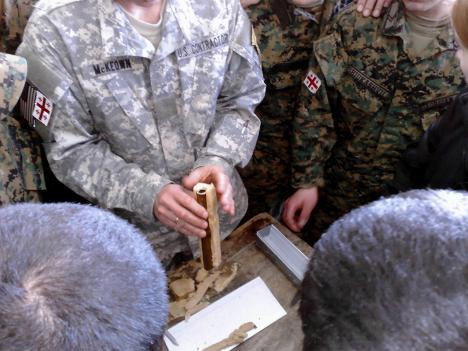
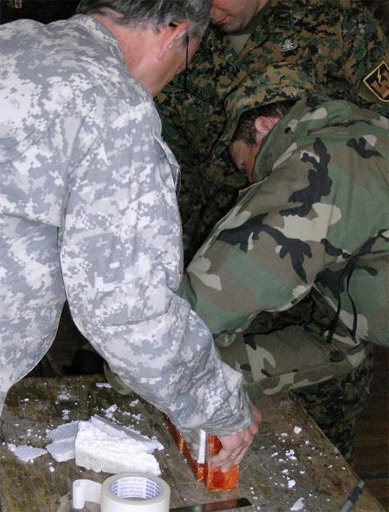
[41.26 sec.] Paata Zakareishvili: I don’t understand why we attacked Tskhinvali… It’s always the same story in Georgia: If i’m right, who the hell are Ossetians? If i’m right, ignore Abkhazians, ignore the opposition. The biggest tragedy of our country is not the Georgian-Abkhaz conflict but the fact that our government is totally incapable of talking to its opponents.
''Saakashvili "planned S. Ossetia invasion": ex-minister'', by Brian Rohan - (Reuters, September 12, 2008) Georgian President Mikheil Saakashvili had long planned a military strike to seize back the breakaway region of South Ossetia but executed it poorly, making it easy for Russia to retaliate, Saakashvili's former defence minister said.
[02:30 sec.] Reporter: It [Abkhazia] looks fantastic. I didn't expect it to be so beautiful.
...I hope we'll go there one day. Not soon but someday.
Excerpt from A. K Adzhindzhal's ''Abkhazia’s Liberation and International Law'' (Sukhum, 2007) '...Experienced Abkhazian expert Liana Kvarchelia writes that Abkhazian society can allow the return only of those Kartvelians [Georgians] who did not fight on the Georgian side and only after they recognize Abkhazia as an independent state. She also says that the same right for return should be given also to descendants of Abkhazian refugees from the Caucasian War of the XIX century, who live mostly in Turkey.
Metin Sönmez
Founder & Administrator, CircassianWorld.com & AbkhazWorld.com
